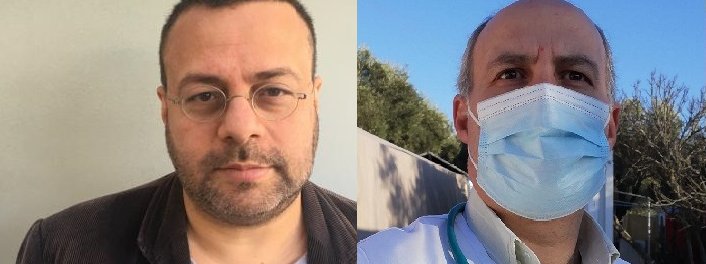On June 11th, 2021, Dr. Apostolos Veizis, Executive Director of INTERSOS Hellas, joined SKAI 100.3’ s radio show “Stigmiotypa” (meaning: Candid Shots) in order to speak with the journalist Vasilis Koufopoulos focusing on the living conditions in the refugee reception centers and the consequent effects on their mental health, especially in the midst of a pandemic.

Veizis took a stand on the whole issue, saying characteristically:
«For people who lived or are living in shelter facilities either on the islands or in the mainland, the pandemic started on March 17, 2020. We are talking about 6 camps on the islands and also in Evros, plus three other structures that are inland, closed for these people and never opened.
There has always been a logic to doing this in order to protect the local population and refugees from the coronavirus. But imagine yourself when someone tells you that you have to stay home and your house is a tent, less than 3 square meters and inside there are eight more people. When someone tells you to wash your hands and you do not have a tap, and at the same time you have to stay in a place designed for 3,000 people, such as Moria where 25,000 people finally lived, and today in many of the accommodation centers on the islands there are more people than whatever fits in reality.
So, you understand that this is an issue that has not been and is not properly managed all this time, and I think that at the moment the “investment” is being made by the Greek government and the EU. is in the wrong direction. And the reason that affects all this situation and the lives of the inhabitants of the island as well as the lives of people who live in these camps is directly related to the process followed by the EU. and the Greek government that left these people to manage on their own, whether we are talking about locals or refugees.
In essence, responsibility was apportioned to those who did not have to do with this from the beginning. In addition, it brought about the systematic criminalization of solidarity, i.e. where there is solidarity either by individuals or by citizens or by organized actions of organizations, ascribing responsibility to elsewhere and not to the real people in charge, the responsibility of the government that follows EU policy at the moment has turned the islands into prisons.
New prisons are being built, and as you know, 300 million euros which will be “invested” in islands to facilitate the establishment of these prisons, places which have systematically proven the effects on physical and mental health.
The very name “reception and identification or hospitality center” practically does not respond to it. These are real prisons. First of all, the implementation of such a policy has failed for five years and so. As a matter of fact, what could be done from the first moment is the integration of these people in the European society, including the Greek one and the other countries’, a process that starts from the time one arrives and his vulnerability is recorded, from the time where the issue of asylum is recorded, from the fact that these people should not stay in these ghettos, in these camps.
These camps were built as an emergency solution with the closure of the route in Northern Macedonia, and the structures built on the islands were set up with the logic of forcibly returning people to Turkey.
For us, health is seen as a whole as defined by the WHO since 1948. It is physical, mental and social well-being. Health no longer exists for these people, because there are effects on their physical health when they do not have accommodation, do not have access to heating, to a suitable structure, to hygienic conditions. Therefore, physical health problems related to either respiratory or dermatological infections or diarrhea are purely a matter of living conditions.
As far as the mental health part is concerned, there are people who have issues and problems from the countries of origin, that is, they have experienced them during the journey, and the issues of their confinement in inappropriate conditions come in addition to this. When you have to experience overcrowding every day, violence including sexual violence, basically what we see on daily basis are symptoms of depression, post-traumatic stress etc. something that firstly appeared in adults and this was later transferred to children due to the fact that at the moment children are over 30% of the population and 7 out of 10 are under 12 years old.
The vaccination process, unfortunately, started a few days ago only from the three islands: Chios, Samos and Lesvos. Today people were vaccinated in Eleonas, a step which has been delayed for a population group that has been under the responsibility of the government since November 18, 2020 as a priority. And the response of the refugees to the vaccination is not quite high, because the vaccination procedure has not been properly organized there».
You can listen to the whole discussion here:
https://www.skairadio.gr/stigmiotypa/episode-2021-06-11
